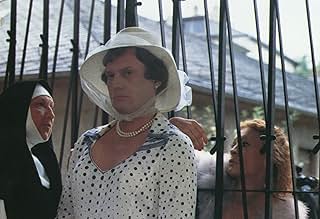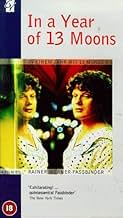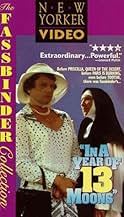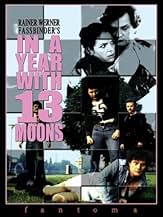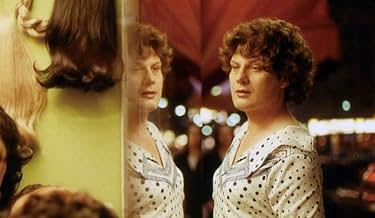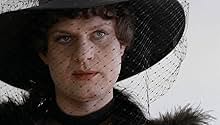NOTE IMDb
7,3/10
5 k
MA NOTE
Ajouter une intrigue dans votre langueA transgender woman tries to salvage something from the wreckage love has made of her life by confronting her anguished past, hoping to find ultimate acceptance among former acquaintances an... Tout lireA transgender woman tries to salvage something from the wreckage love has made of her life by confronting her anguished past, hoping to find ultimate acceptance among former acquaintances and herself.A transgender woman tries to salvage something from the wreckage love has made of her life by confronting her anguished past, hoping to find ultimate acceptance among former acquaintances and herself.
- Réalisation
- Scénario
- Casting principal
- Récompenses
- 1 victoire au total
Lilo Pempeit
- Schwester Gudrun
- (as Lieselotte Pempeit)
Janez Bermez
- Oskar Pleitgen
- (non crédité)
Rainer Werner Fassbinder
- Self
- (images d'archives)
- (non crédité)
Günther Holzapfel
- Angestellter H. H. Brei
- (non crédité)
Ursula Lillig
- Putzfrau
- (non crédité)
Augusto Pinochet
- Self
- (images d'archives)
- (non crédité)
Avis à la une
First of all, I would not call this a trans-or LGBT-themed film. Elvira, the main character, may have had trans surgery, but the plot makes it clear that they aren't a trans woman, that they made a mistake having the surgery. But it's also clear that the main character isn't a man, either-they are a person with a lack of identity. So it's a mistake to classify this one with the stories of trans men and women, it's about something very different.
Elvira's lack of identity surfaces in the fact that they can't remember their childhood at all, and when they search for details on it, the results are even more frustratingly ambiguous. They think that loving someone else gives them an identity, and it is this part of falling in love that they love the most-not so much being with another human being, but what it turns them into. That's why they undergo the surgery-because they think it will make them something when they are starting out as nothing. The surgery is just another turn of the screw for them-just another way of groping for an identity that isn't there. It's a much bleaker and more existential story than any trans-themed film I've ever seen.
The film leaves us with more questions than answers, which is how it should be. The characters speak in long monologues that raise lots of questions but no answers. They're more riddles than statements, and it's maddening. Maddening because the more Elvira searches for answers, the more they slip away from them. It's like a horrible taunt for Elvira, and we, in the audience, are not spared one moment of the terrible ambiguity of it all. Fassbinder's compositions add to the confusion, showing us a world that is as unclear to us as it is to Elvira.
For anyone going into this film looking for an LGBT story, you will be disappointed, as you will be if you like a story with a solid resolution. But for those who tolerate ambiguity and frustration-and, indeed, see how they can be virtues in art-you may well be dazzled and hypnotized.
Elvira's lack of identity surfaces in the fact that they can't remember their childhood at all, and when they search for details on it, the results are even more frustratingly ambiguous. They think that loving someone else gives them an identity, and it is this part of falling in love that they love the most-not so much being with another human being, but what it turns them into. That's why they undergo the surgery-because they think it will make them something when they are starting out as nothing. The surgery is just another turn of the screw for them-just another way of groping for an identity that isn't there. It's a much bleaker and more existential story than any trans-themed film I've ever seen.
The film leaves us with more questions than answers, which is how it should be. The characters speak in long monologues that raise lots of questions but no answers. They're more riddles than statements, and it's maddening. Maddening because the more Elvira searches for answers, the more they slip away from them. It's like a horrible taunt for Elvira, and we, in the audience, are not spared one moment of the terrible ambiguity of it all. Fassbinder's compositions add to the confusion, showing us a world that is as unclear to us as it is to Elvira.
For anyone going into this film looking for an LGBT story, you will be disappointed, as you will be if you like a story with a solid resolution. But for those who tolerate ambiguity and frustration-and, indeed, see how they can be virtues in art-you may well be dazzled and hypnotized.
The story the idea of this movie, is amazing. It really does showcases how somebody that went through extreme child trauma being isolated, lonely, sad, wanted love from a male figure, and that was not possible from the one he-she wanted. It really is a fascinating story.
However, i have a huge problem with this movie and that's the pacing. I can assure you that 40 minutes or so could of been removed from this movie, and we'd have a better paced movie.
Minus the pacing, everything here works. The acting is alright, the camera work is okay, the story is alright. Everything here works. Minus the pacing.
The cow slaughtering scene was completely out of left field. Yes yes, our main character our star, worked as a butcher. But the problem with that is, this whole movie is a tragic, depressing drama. And out of no where, we just get cow murder exploitation? Why??? It really did not have to be in this movie at all! We had a tragic drama, and we added cow murder for no reason! It's so out of field, it pulls you out of the story completely, and it felt like i was watching FACES of DEATH again. Ludacris.
Another problem i got is, the suicide scene of that man. It has nothing to do with the story it's just added there so the movie gets longer and padded. This entire movie could of been better if stuff that have nothing to do with the movie aren't here. Also the prologned television scene, it took them ages for that to finish.
Ultimately yes i enjoyed this movie, but at the same time it is a chore to get through it really is. Also i think i have to rewatch this probably 2 - 3 time to actually get all the details. There's many details in this that are really hard to follow.
I mean if you are into drama misery films like JACOB's LADDER, you'll probably enjoy this.
However, i have a huge problem with this movie and that's the pacing. I can assure you that 40 minutes or so could of been removed from this movie, and we'd have a better paced movie.
Minus the pacing, everything here works. The acting is alright, the camera work is okay, the story is alright. Everything here works. Minus the pacing.
The cow slaughtering scene was completely out of left field. Yes yes, our main character our star, worked as a butcher. But the problem with that is, this whole movie is a tragic, depressing drama. And out of no where, we just get cow murder exploitation? Why??? It really did not have to be in this movie at all! We had a tragic drama, and we added cow murder for no reason! It's so out of field, it pulls you out of the story completely, and it felt like i was watching FACES of DEATH again. Ludacris.
Another problem i got is, the suicide scene of that man. It has nothing to do with the story it's just added there so the movie gets longer and padded. This entire movie could of been better if stuff that have nothing to do with the movie aren't here. Also the prologned television scene, it took them ages for that to finish.
Ultimately yes i enjoyed this movie, but at the same time it is a chore to get through it really is. Also i think i have to rewatch this probably 2 - 3 time to actually get all the details. There's many details in this that are really hard to follow.
I mean if you are into drama misery films like JACOB's LADDER, you'll probably enjoy this.
Fassbinder's genius is making you feel as trapped and desperate as Elvira, you really feel empathy for the character. Only the visit with her family is there a brief respite from her pain. Kudos for Fassbinder for his good taste in using Suicide's "Frankie Teardrop" on the soundtrack--a song about a man who feels trapped, but directs his anger outward, rather than inward, like Elvira.
I have to save my comments for later...I began watching this film last night and, as disturbing as the slaughterhouse scene actually is, I was only able to make it halfway through. I will return. It amazes me when a film disturbs me so much that I cannot watch it in one sitting. I had similar reactions to both Pasolini's "Salo" and to Cronenberg's "Crash".
But I'm curious to learn from anyone who might have a clue why Nino Rota's theme music from "Amarcord" (original orchestration) was put in this movie's first half and yet isn't credited on IMDb's list of "combined details".
Anybody who might offer some insight on this omission....thanks for posting it here....
But I'm curious to learn from anyone who might have a clue why Nino Rota's theme music from "Amarcord" (original orchestration) was put in this movie's first half and yet isn't credited on IMDb's list of "combined details".
Anybody who might offer some insight on this omission....thanks for posting it here....
As some others have written or implied this film is absolutely exhausting. It doesn't abandon its character or his life at any time although at times we almost WANT relief. Mahler's music in films has been dutifully noted. It can be almost as depressing in concert version. As for Nino Rota's "happy" music, or "life just continues (joyfully)" score, the irony isn't lost either. This is a one-man job and therefore takes risks that few producers or companies would tolerate under normal circumstances. I was profoundly moved by the film; I just don't plan to see it again for a while.
Curtis Stotlar
Curtis Stotlar
Le saviez-vous
- AnecdotesThe tape-recorded narration heard throughout the film (particularly during the final scene) was not scripted. Volker Spengler (playing Elvira Weishaupt) and Rainer Werner Fassbinder recorded the narration together, with Fassbinder asking questions and Spengler responding in character. In the final cut of the film, Fassbinder's voice is edited out.
- Bandes originalesSchöner fremder Mann
Music and Words by Athena Hosey and Hal Gordon and German lyrics by Camillo Felgen
Performed by Connie Francis
Meilleurs choix
Connectez-vous pour évaluer et suivre la liste de favoris afin de recevoir des recommandations personnalisées
- How long is In a Year with 13 Moons?Alimenté par Alexa
Détails
- Date de sortie
- Pays d’origine
- Langue
- Aussi connu sous le nom de
- In a Year with 13 Moons
- Lieux de tournage
- Sociétés de production
- Voir plus de crédits d'entreprise sur IMDbPro
Box-office
- Budget
- 700 000 DEM (estimé)
- Durée2 heures 4 minutes
- Mixage
- Rapport de forme
- 1.66 : 1
Contribuer à cette page
Suggérer une modification ou ajouter du contenu manquant

Lacune principale
By what name was L'année des treize lunes (1978) officially released in India in English?
Répondre
